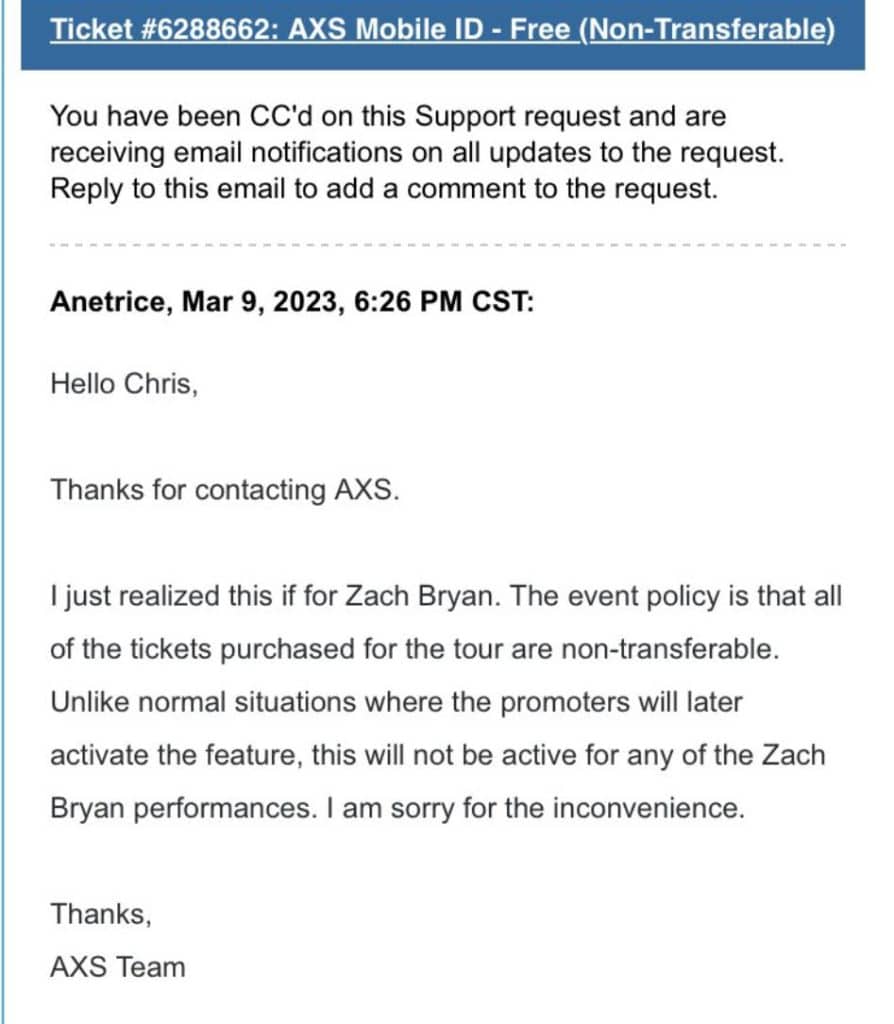Zach Bryan’s Burn Burn Burn tour is schedule to make its way to Albany’s MVP Arena on Friday, opening the holiday weekend. But the tour-wide effort to disable ticket resale by turning off ticket transfer could be set to cause a major clash with consumers, who may not be able to move tickets they’ve sold out to the account of those who have purchased them.
Should that be the case, it would be in violation of New York’s state law regulating ticket sales and resales. The tour allegedly ignored a similar law in Virginia, where ticket resale for a show in Charlottesville was never enabled, putting Bryan, his management, and promoter AEG in line for millions in fines if the state’s Attorney General opts to enforce the law for all 14,000+ tickets issued for that performance.
“The prohibition on transfer for the Charlottesville show clearly violated Virginia law. It was a complete affront to the Virginia lawmakers who recognized the value to fans that transferability provides as well as the harm caused by allowing a ticket issuer to control a ticket after it has been sold,” says Gary Adler of the NATB. “It was also a slap in the face of consumers. Poll after poll shows that consumers overwhelmingly say no to transfer restrictions, and believe that they paid for their tickets and they should have the freedom and choice to do what they want with them. “
Friday’s show in Albany features Bryan joined by Trampled by Turtles, and has reportedly been sold out since nearly immediately after going on sale. There is a face-value capped resale exchange available for the concert, as there has been for all concerts on the tour. But no tickets have been available on that marketplace at any point over the prior two weeks when checked for availability.
That means that consumers have almost certainly been securing tickets through traditional independent ticket resale platforms like Vivid Seats, where tickets for Friday’s show start at $157 before fees ($215 all-in), or Ticket Club, where tickets are available to members for as low as $203.
Should the tour organizers opt against turning on transfer, many of those consumers who have bought or sold tickets through these other marketplaces are going to have major issues come Friday night, when it is impossible to deliver the tickets to the person who needs them to get in – short of giving that person access to the account in which the tickets reside, which is a major security concern for all involved (and risky for anyone who has tickets to different shows in that account).
Messaging regarding the ticket transfer restriction for the tour in states where the law protects consumer rights to use, sell, or transfer tickets they’ve purchased as they see fit, has been terribly unclear. After enormous fanfare indicating the tour’s plan to restrict consumer tickets to the account they were purchased from, save for the closed AXS resale system, fine print shows that resale and transfer might have to be allowed in some states. But on the event page for MVP Arena, the ticket restrictions appear to be clearly stated:
Tickets purchased on AXS cannot be transferred or resold for profit. If a fan can no longer attend the show, tickets can be sold on the Zach Bryan AXS Marketplace for face value to another fan.
TicketNews has repeatedly contacted Bryan’s tour management, as well as AEG and its ticketing subsidiary AXS, asking for clarification on their ticket resale or transfer policy relative to states like Virginia, New York, and Colorado when state law makes closed loop resale systems illegal. No response has yet been received.
An email forwarded to TicketNews by a consumer appears to confirm that ticket transfer will not be allowed for the New York shows. A fan who filed a complaint over the transfer restriction for a later show in New York with the Better Business Bureau received a reply from AXS that stated the promoter is not turning on ticket transfer for any show on the tour, regardless of the location or state laws involved.

New York’s regulations surrounding allowed restrictions on tickets sold for events in the state are clear: It is prohibited for “any operator of a place of entertainment or operators agent, to:
(c) (c) employ a paperless ticketing system unless the consumer is given an option to purchase paperless tickets that the consumer can transfer at any price, and at any time, and without additional fees, independent of the operator or operator’s agent. Notwithstanding the foregoing, an operator or operator’s agent may employ a paperless ticketing system that does not allow for independent transferability of paperless tickets only if the consumer is offered an option at the time of initial sale to purchase the same tickets in some other form that is transferrable independent of the operator or operator’s agent including, but not limited to, paper tickets or e-tickets.
(NY Chapter 11-C, Title G, Article 25.30)
Violations of the provision banning restrictive ticketing systems are $250 per violation, which can be doubled if the violator is a corporation. Assuming a full capacity show of 17,500 (Bryan’s tour claimed it was sold out almost immediately), that means penalties could reach as high as $8.75 million for Friday, plus another $13 million if the tour continues to keep transfer locked down against state law for June stops at Forest Hills Stadium in Queens.
Should ticket transfer remain shut off for the Albany or Forest Hills shows, the New York Attorney General’s office told TicketNews that consumers can file a complaint with their office using their website here. They were unable to comment on any other aspect of this story or the laws in question.



